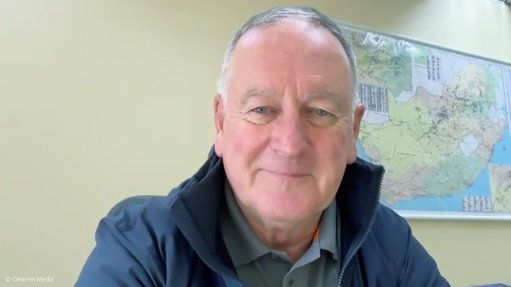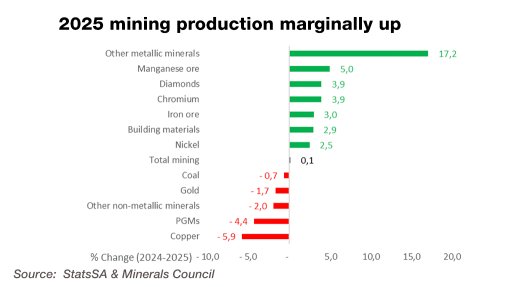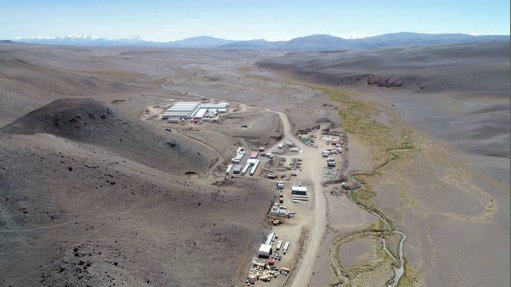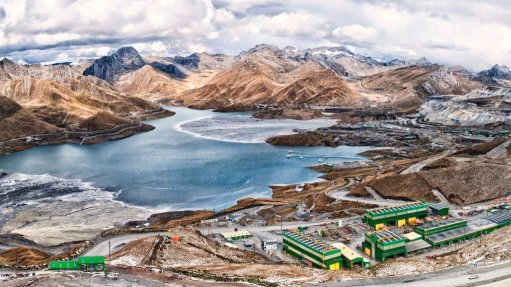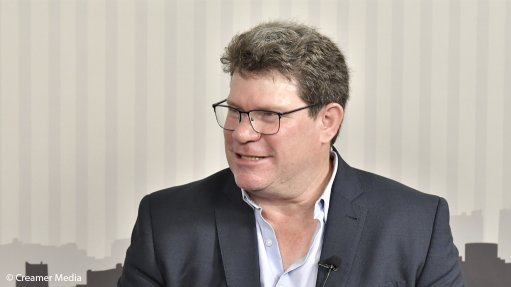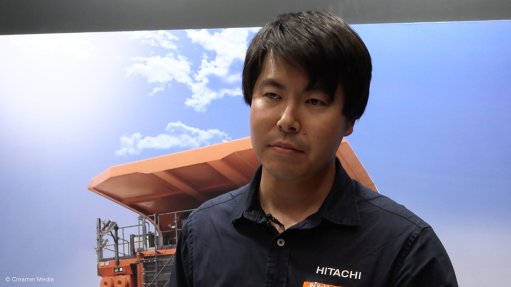Recycle like there’s no tomorrow, big screen at Oppenheimer event urges attendees

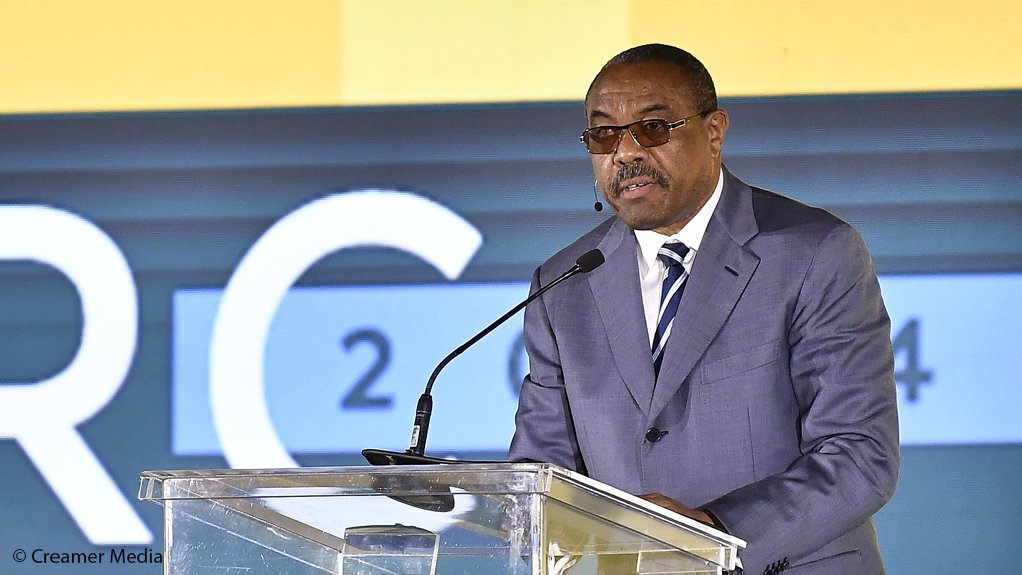
Oppenheimer Research Conference covered by Mining Weekly's Martin Creamer. Video: Darlene Creamer.
Hailemariam Desalegn
Photo by Creamer Media Chief Photographer Donna Slater
JOHANNESBURG (miningweekly.com) – Recycle like there’s no tomorrow were the urging words flashed across the large screen at the thirteenth Oppenheimer Research Conference, where long-time former diamond mining luminary Nicky Oppenheimer declared that it is nature that is calling the shots when it comes to climate change mitigation prospects.
Oppenheimer was followed by keynote speaker, Hailemariam Desalegn, the former Prime Minister of Ethiopia, who told the 450 scientists present: “The clock is ticking. To confront this crisis, we must embrace radical collaboration and science without boundaries.” (Also watch attached Creamer Media video.)
Regarding this Namibian PhD student’s question: “What is more important. That we, as Homo sapiens, resolve climate change, or that we resolve the relationship between man and nature”, Oppenheimer had this response: “It's more important that we resolve the relationship between man and nature, because if we can do that, climate change will not exist.
“On the other hand, you can see a situation where scientists could resolve climate change, but by destroying nature. In resolving that issue between man and nature, we have to find a way to cohabit, to work together,” Oppenheimer urged at the event covered by Engineering News & Mining Weekly.
Meanwhile, former water and environmental engineer Desalegn declared climate change and nature loss “the greatest existential threat we’ll collectively face”.
Already, in Africa alone, 6 400 animal species and 3 100 plants are at risk of extinction, with vertebrates down 30% since 1970.
Soil erosion, salinisation, pollution and loss of vegetation have degraded a fifth of Africa's land surface and the Congo basin, one of the world’s lungs, is losing up to 1.2-million hectares of tropical forest a year, resulting in a 30% decline in tree cover.
Meanwhile, the blue economy, once projected to grow to $405-billion by 2030, is now in a 30% contraction owing to mass coral bleaching by climate-influenced ocean acidification, plastics pollution and poleward marine life migration.
Climate change and the nature loss span countries and continents, “and therefore our solutions must transcend national interests and political divides”, Desalegn pointed out.
“The future of our planet hinges on our ability to radically collaborate across borders, disciplines and sectors.
“The effects of climate change and nature loss know no borders. They are global phenomena, spanning countries and continents, and therefore our solutions must transcend national interests and political divides.
“The future of our planet hinges on our ability to collaborate radically across borders, disciplines and sectors,” Desalegn highlighted.
Being encouraged is the seamless working together of scientists the world over, the empowering of citizens to take part in scientific enquiry and action and the removal of the barriers hindering the free flow of information and expertise.
Wanted is the amplification of the voices of Indigenous peoples and local communities whose relationship with nature provides valuable insight.
“International financing must be seen as an investment, not a cost, one that will create high economic returns and avoid massively accelerating future costs associated with the global existential threat of climate change and nature loss.
“Fundamentally, if we want to maintain a livable planet, urgent investment is needed now to conserve intact ecosystems, mainly in the developing world.
“For too long, the world stood by and did nothing, and we are now in the eleventh hour. Our planet's future depends on our willingness to work together, to transcend boundaries and to put our shared humanity first.
“Together, we can create a world where innovation flourishes, where knowledge flows freely, and where humanity learns to coexist with nature rather than exploit it.
“Together, we can avert further climate catastrophe, make peace with nature,” Desalegn advocated.
Article Enquiry
Email Article
Save Article
Feedback
To advertise email advertising@creamermedia.co.za or click here
Press Office
Announcements
What's On
Subscribe to improve your user experience...
Option 1 (equivalent of R125 a month):
Receive a weekly copy of Creamer Media's Engineering News & Mining Weekly magazine
(print copy for those in South Africa and e-magazine for those outside of South Africa)
Receive daily email newsletters
Access to full search results
Access archive of magazine back copies
Access to Projects in Progress
Access to ONE Research Report of your choice in PDF format
Option 2 (equivalent of R375 a month):
All benefits from Option 1
PLUS
Access to Creamer Media's Research Channel Africa for ALL Research Reports, in PDF format, on various industrial and mining sectors
including Electricity; Water; Energy Transition; Hydrogen; Roads, Rail and Ports; Coal; Gold; Platinum; Battery Metals; etc.
Already a subscriber?
Forgotten your password?
Receive weekly copy of Creamer Media's Engineering News & Mining Weekly magazine (print copy for those in South Africa and e-magazine for those outside of South Africa)
➕
Recieve daily email newsletters
➕
Access to full search results
➕
Access archive of magazine back copies
➕
Access to Projects in Progress
➕
Access to ONE Research Report of your choice in PDF format
RESEARCH CHANNEL AFRICA
R4500 (equivalent of R375 a month)
SUBSCRIBEAll benefits from Option 1
➕
Access to Creamer Media's Research Channel Africa for ALL Research Reports on various industrial and mining sectors, in PDF format, including on:
Electricity
➕
Water
➕
Energy Transition
➕
Hydrogen
➕
Roads, Rail and Ports
➕
Coal
➕
Gold
➕
Platinum
➕
Battery Metals
➕
etc.
Receive all benefits from Option 1 or Option 2 delivered to numerous people at your company
➕
Multiple User names and Passwords for simultaneous log-ins
➕
Intranet integration access to all in your organisation










